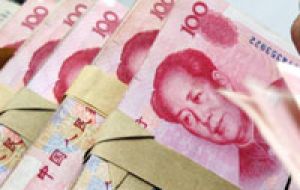MercoPress. South Atlantic News Agency
China promises “gradual reform” to counter record surplus

China will pursue gradual reform in the foreign exchange market this year and will aim to keep the currency basically stable, the People's Bank of China said on Monday. The central bank also said that while it was willing to accelerate financial reforms it needed more time to reduce its trade surplus.
The announcement comes when China reported a trade surplus of 23.8 billion US dollars in February, almost then times the February 2006 figure. China's trade surplus in 2006 reached 178 billion US dollars and January this year 15.9 billion. China's main trade partners, particularly United States, are demanding a stronger free floating yuan and banking transparency to end with "unfair competition" and help alleviate the world's economy misbalances. "China wants to reduce its trade surplus, but we cannot imagine the issue being solved in the short term or by measures solely in the trade sector," said Commerce Minister Bo Xilai at a press conference on the sidelines of the annual session of the National People's Congress. "The surplus does not come solely or mainly from trade, but is caused by the overall structure of the industrial sector and international economy." Zhou Xiaochuan, governor of the People's Bank of China, the central bank, said the most effective approach to addressing the imbalance would be to adjust the structure of the country's economy. Some domestic measures that have been floated include expanding consumption and developing the country's service industry. Other steps include increasing imports and encouraging Chinese companies to invest overseas, he said. "It will take time to adjust. It should be a slow, gradual process," he added. "But an adjustment of this sort should be essential to addressing the imbalance". A release from the People's Bank of China said that the country will strengthen controls on the money supply and maintain a stable monetary policy in 2007. Among measures to be introduced are over-the-counter yuan derivatives and interbank yuan futures, plus open market operations and changes in banks' required reserves besides other tools to manage liquidity. The central bank also said it would keep credit in check by guiding commercial banks concerning the sectors that they should lend to. The People's Bank of China added that it would earnestly apply policies to keep the country's property sector sound and healthy. The yuan has gained about 7% since a decade-long peg to the dollar was broken in 2005. The central bank on Monday set the reference rate for yuan trading at 7.7474 against the dollar. Some critics say that the Chinese currency still is not appreciating fast enough The latest announcements are also in response to last week's comments by US Treasury Secretary Henry Paulson that China should move faster on opening its financial markets to sustain high economic growth and stability. "The risks for China are greater in moving too slowly than in moving too quickly toward transparent, liquid, stable capital markets," Paulson said on March 7 while speaking at Shanghai's newly opened Futures Exchange. He also urged China to relax currency controls that keep the yuan from rising more quickly in value against the dollar. "The system makes Chinese goods relatively cheap and adds to the trade imbalance. It also limits China's monetary policy options and puts a huge burden on China's banking system", Paulson said. Meanwhile China's Finance Minister Jin Renqing unveiled a government plan to overhaul the way the country manages its massive 1.07 trillion US dollars stockpile of foreign exchange reserves, the biggest in the world and are growing at about 20 billion per month thanks to the country's massive trade surpluses. Beijing has typically held about 70% of its reserves in U.S. dollar assets. However, now the plan is to create a new state agency to divert more than 200 billion in funds to invest in all sorts of higher-yielding equity assets and perhaps strategic energy assets around the world or even some select social programs at home.




Top Comments
Disclaimer & comment rulesCommenting for this story is now closed.
If you have a Facebook account, become a fan and comment on our Facebook Page!